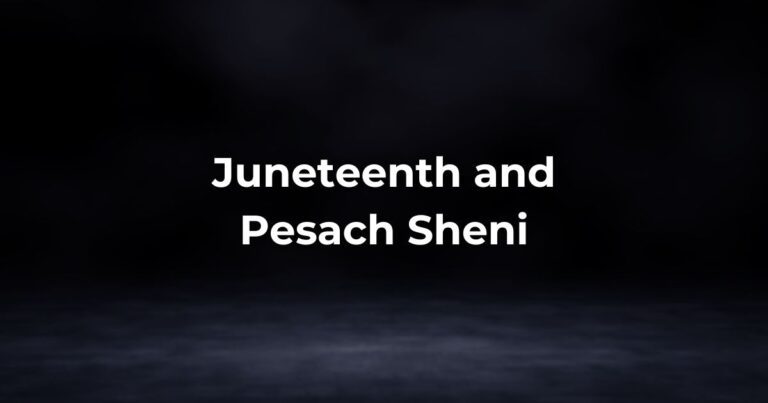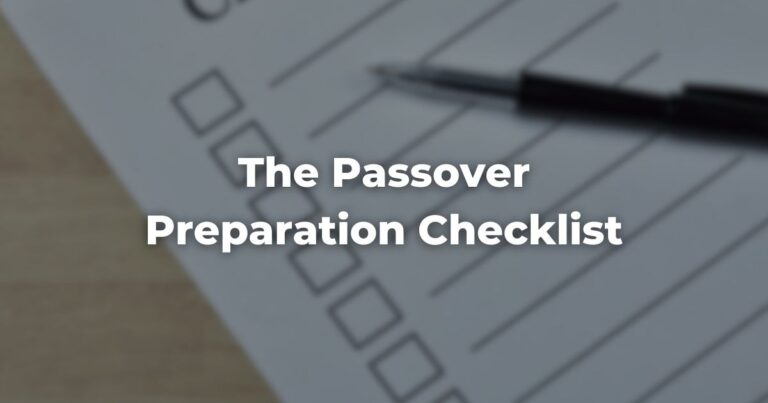As my children are eagerly looking forward to Spring Break and have their own countdown, you and I are probably also contemplating at least one of two countdowns of similar nature. As this time of the year approaches, I find myself preparing for budget meetings and Pesach. Both have their unique challenges and demands on my time and energy.
Growing up Pesach was the holiday I looked forward to the most despite the preparatory work that needed to occur leading up to the holiday.
When my time came I was giddy with anticipation when I had the chance to recite the 4 Questions: Mah Nistanah Halilah Hazeh Mikol Hallelot. However, in reading the Haggadah as I got older and especially now that I have children I have been more aware of one particular part leading up to the 4 questions.
In most traditional Haggadot it breaks down the personalities of the 4 children as:
Wise, Wicked, Simple, and One who is too young to know to even ask questions.
In MishnahA collection of rabbinic teachings edited in Israel around 225 CE. Organized in six sedaraim by subject matter and dealing with both ritual and civil law. Both the Jerusalem and Babylonian Talmud are expansive discussions of the Mishnah. Read more Pesachim 10:4 it says:
מָזְגוּ לוֹ כוֹס שֵׁנִי, וְכָאן הַבֵּן שׁוֹאֵל אָבִיו, וְאִם אֵין דַּעַת בַּבֵּן, אָבִיו מְלַמְּדוֹ, מַה נִּשְׁתַּנָּה הַלַּיְלָה הַזֶּה מִכָּל הַלֵּילוֹת, שֶׁבְּכָל הַלֵּילוֹת אָנוּ אוֹכְלִין חָמֵץ וּמַצָּה, הַלַּיְלָה הַזֶּה כֻלּוֹ מַצָּה. שֶׁבְּכָל הַלֵּילוֹת אָנוּ אוֹכְלִין שְׁאָר יְרָקוֹת, הַלַּיְלָה הַזֶּה מָרוֹר. שֶׁבְּכָל הַלֵּילוֹת אָנוּ אוֹכְלִין בָּשָׂר צָלִי, שָׁלוּק, וּמְבֻשָּׁל, הַלַּיְלָה הַזֶּה כֻלּוֹ צָלִי. שֶׁבְּכָל הַלֵּילוֹת אָנוּ מַטְבִּילִין פַּעַם אַחַת, הַלַּיְלָה הַזֶּה שְׁתֵּי פְעָמִים. וּלְפִי דַעְתּוֹ שֶׁל בֵּן, אָבִיו מְלַמְּדוֹ…
The attendants poured the second cup for the leader of the seder, and here the son asks his father the questions about the differences between Passover night and a regular night. And if the son does not have the intelligence to ask questions on his own, his father teaches him the questions.
While I’m not thrilled with the descriptors used to symbolize the children, there is logic in this approach that I believe we all can learn from.
Often times in my role as an Human Resources Professional I find myself in meetings with staff in conflict. Whether it be a real or perceived issue by one or both parties the conflict has escalated to a point requiring immediate intervention.
In some of those cases, the staff member representing a leadership role is seeking to discipline or terminate the employee even for the issue at hand. On the flip side, the employee feels they’re the aggrieved party who is contemplating lawsuits.
One of the purposes I serve is to ask the probing questions to gain better insight and understanding about the situation.
More times than not the root of the problem is the lack of communication and dialogue between the two parties. Neither took the time to ask the question let alone the right questions to resolve the problem.
Both had the perception it was the other person’s responsibility to either know through some magical osmosis what to do, how to do it, who to ask, or what to ask.
This is the lesson we can glean from this Mishnah and this part of the Seder and the holiday in general.
Our children won’t know why we have removed dishes or food from the pantry for just this week. Our guests at our table won’t know why we have a roasted egg on the middle of the table. We may not grasp how to wrap our heads around asking G-d to pour out wrath on nations that are in a sense non-believers.
How do we fix this? How can we mitigate the interpersonal conflicts we have at home and at work?
Ask the questions. Do the lead up work, roll up your sleeves, and dig deeper stuff.
Step away from our assumptions and take the bold step of sharing knowledge and information.
We should strive to bring about awareness by creating a space where inquisitiveness is embraced and encouraged. May our Sederaim be full of joy, laughter, wonder, and curious investigation.
Author
-

Chaim Respes has worked in Human Resources for over 20 years. He is the President/CEO of R&R HR LLC, a human resources consulting firm, and has helped companies navigate through the complexities of Human Capital Management. He has also taught in Religious Schools in the Tri-State are for various Conservative Synagogues. He has spent the last decade educating students at Congregation Beth El in Voorhees. As part of working in Human Resources, Chai has worked hard to support organizations in their Equality and Leadership initiatives. He lives in New Jersey and enjoys coaching youth sports with his three sons.
View all posts




